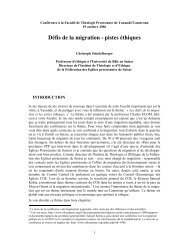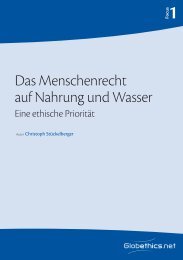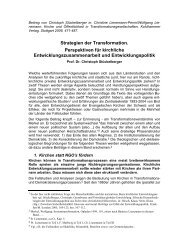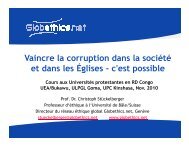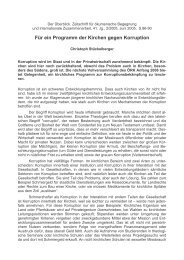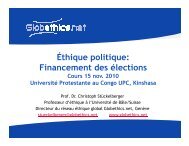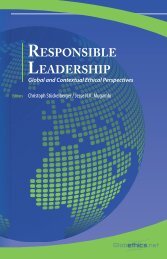BREAK THE CHAINS OF OPPRESION AND THE YOKE OF ...
BREAK THE CHAINS OF OPPRESION AND THE YOKE OF ...
BREAK THE CHAINS OF OPPRESION AND THE YOKE OF ...
You also want an ePaper? Increase the reach of your titles
YUMPU automatically turns print PDFs into web optimized ePapers that Google loves.
FuturE whose injuries we continue to worsen through our irresponsibility in the present.<br />
Closing our ears to this call would be nothing less than giving up our claim to be<br />
Christ’s disciples.<br />
Being able to hear the voice of these communities already threatened by climate<br />
change is a blessing to us in shaping a theological response, especially as many<br />
who are not able to make themselves heard are also threatened. Among these are<br />
communities in sub-Saharan Africa for whom changes in climate have already<br />
brought increasingly frequent famines and droughts, as well as those in India,<br />
the Americas and Europe who have suffered heat waves and storms intensified by<br />
global warming. 17<br />
There is also a much larger group of human beings threatened by climate change<br />
who have no chance of making themselves heard: those not yet born. As well as<br />
alerting ourselves to the demand of love and justice to our present neighbours,<br />
we need to understand what it means to treat as neighbours those in following<br />
generations. The covenant God made after the flood was with all the creatures in<br />
every generation descended from those saved in the ark (Gen. 9): we must not<br />
make the mistake of thinking that those alive today have any superiority under<br />
the covenant over those to follow us. For some, thinking of children and grandchildren<br />
helps to give faces to those who will inherit the earth we leave (cf. Mal.<br />
4.6), but this must be only a first step in appreciating the enormity of the moral<br />
demand of future generations. The requirement to develop our moral imaginations<br />
in this direction is particularly crucial given that the worst effects of failing<br />
to reduce carbon emissions now will be felt by those alive one hundred years and<br />
more from now. Christians should resist market-based economic analyses that<br />
discount the well-being of future generations in relation to those alive today, and<br />
thereby portray as unattractive actions that will benefit future generations but<br />
which incur immediate costs. 18 � � � � �<br />
17 In 2005, Lord Robert May, President of the Royal Society, drew attention to the findings<br />
that ‘climate change, largely caused by a rise in greenhouse gas emissions from human<br />
activities, may already be responsible for an increase in drought conditions, and<br />
hence for a rise in the risk of famine, in eastern Africa where millions are already at risk<br />
of hunger’ (‘Open letter to Margaret Beckett and other G8 energy and environment<br />
ministers’, October 2005, http://royalsociety.org/page.asp?id=3834). See also Andrew<br />
Simms and John Magrath, Africa-Up in Smoke? 2: The Second Report on Africa and<br />
Global Warming from the Working Group on Climate Change and Development,<br />
Vol. 2 (Oxford: Oxfam Publishing, 2006).<br />
18 For a theological discussion of this issue, see Rachel Muers, Living for the Future: Theological<br />
Ethics for Coming Generations (London: T & T Clark, 2008); for a detailed<br />
philosophical and economic analysis, see John Broome, Counting the Cost of Global<br />
Warming (Cambridge: White Horse Press, 1992). See also Herman Daly and John<br />
Cobb, For the Common Good: Redirecting the Economy toward Community, the<br />
Environment, and a Sustainable Future (Boston: Beacon Press, 1989).<br />
������������������������������������������������<br />
� � � � ������������������������<br />
�<br />
156<br />
– Hope in God’s Future –



